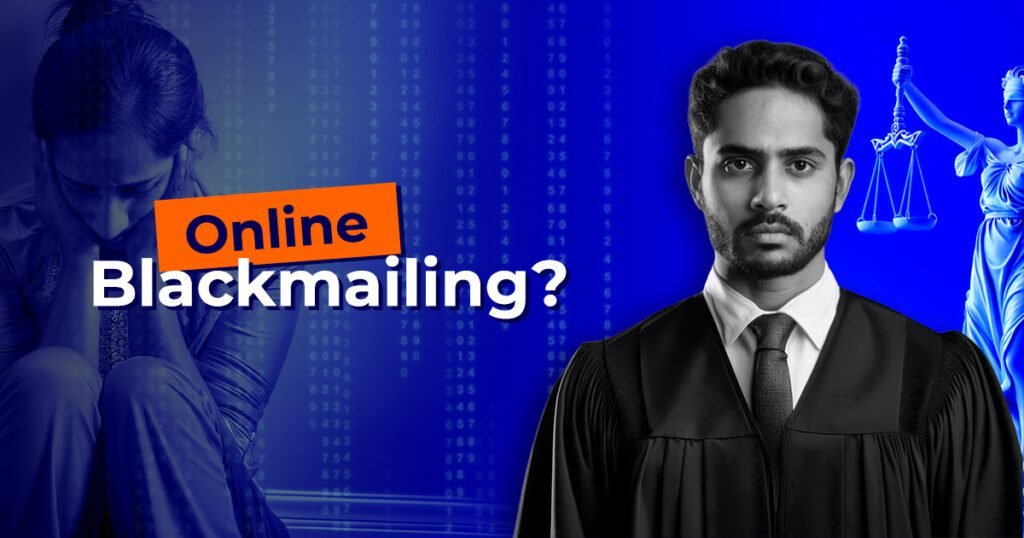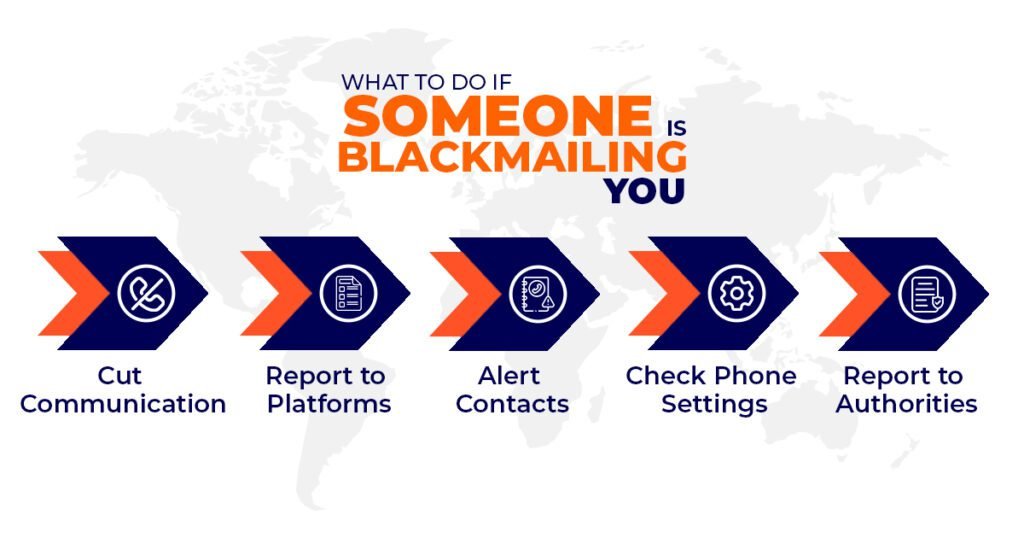
India is becoming the extortion capital of the world, with nearly 500 cases of extortion and blackmail reported daily, yet only 0.5% of these cases are officially recorded. Online blackmailing often involves threats to release sensitive personal photos or information unless money is paid. Common tactics include using morphed photos, tampering with webcams to record videos without the victim’s knowledge, and honey trapping middle-aged individuals.
Here is the guidebook to fight against cybercrime using online fraud complaint in India:
1. How can someone (Online Blackmailing) hack into your social media to get your pictures?
Hackers can access your social media accounts in several ways: obtaining your login information through phishing attacks, stealing your logins via malware, or using credentials from a data breach. Once they have access, hackers can exploit your photos and videos, and even read your messages, including shared media.
Additionally, hackers can infiltrate your phone through apps that have camera and microphone permissions. Mobile spyware, a type of malware, allows hackers to steal information and view anything within your phone’s camera range. It can also grant access to your microphone, location, calendar, and contacts, enabling hackers to record your videos and calls.

2. What to do if someone is blackmailing you with your pictures?
The first thing to remember is that the law is on your side, and blackmailers will try to exploit your fear of public exposure. It’s not the time to panic. If blackmailers sense your fear due to societal pressure, you’ll become their long-term target for money or favours. The cycle of blackmail will continue unless you take action or file an online fraud complaint in India .
Whether the blackmailer is known or unknown, follow these steps:
- Cut Communication: Stop all communication with the blackmailer but don’t delete their threatening messages, emails, or any other conversations. Record their calls if possible, as these can be used as “digital evidence” when you seek legal action.
- Report to Platforms: If hackers are using your social media to blackmail you, report it to the platform. Most platforms have policies to handle such issues.
- Alert Contacts: Inform all your contacts not to click on any links or reply to anything from your hacked social media account.
- Check Phone Settings: Review the permission and accessibility settings on your phone.
- Report to Authorities: If the blackmailing continues, report it to the nearest police station. If the police refuse to take action or are delayed, you can file a complaint with the magistrate.
3. What are the Steps For Filing Online Fraud Complaints in India for Cyber Blackmailing ?
Indian law and the government offer dedicated websites and helplines to combat cyber crime. You can reach the National Police Helpline at 112, the National Women Helpline at 181, or the Cyber Crime Helpline at 1930. To file an online complaint, follow these steps:
- Access the Portal: Visit the official Indian Government website: https://cybercrime.gov.in/ to report cybercrime.
- Choose the Category: There will be two categories: “Report Women/Child Related Crime” or “Report Other Cyber Crime”. For blackmailing, choose “Report Other Cyber Crime”.
- Select Reporting Categories: Click “File a Complaint” to start the process.
- Register: Register as a new user with your name, email address, and contact number.
- Fill Out the Form:
– Basic Info (name, contact)
– State & District
– Type of Crime (Cyber Blackmailing)
– Incident Details (date, time, clear explanation)
– Accused Details (optional: email, social media profile)
– Evidence (optional: screenshots, emails)
- Review & Submit: Note your Complaint Number and track the status regularly.
4. Is it a crime to defame you online ?
The primary danger of blackmailing is the potential for defamation within the community. Often, hackers demand money to keep quiet. Don’t get nervous and understand your rights and file an online fraud complaint in India . :
- Criminal Intimidation: Blackmailing with videos that damage reputation or property can be reported under Section 503 of the BNS.
- Extortion: Demands made through blackmailing are illegal and can be prosecuted under Section 384 of the Bharatiya Nyaya Sanhita.
- Preventative Measures: Under Section 108(1)(i)(a) of the Bharatiya Nagarik Suraksha Sanhita, victims can alert the magistrate about potential distributors of obscene material, who can then be restricted from sharing it.
- Obscene Material: Section 292 of the Bharatiya Nyaya Sanhita applies if blackmail involves threatening to reveal compromising pictures through electronic media.
- Privacy Violation: Section 66E of the Information Technology Act 2000 addresses unauthorised video capture or dissemination of personal images.
- Defamation: Section 67 of the Information Technology Act 2000 covers cases where videos are circulated to defame an individual.
- Hidden Cameras: Section 67A of the Information Technology Act 2000 criminalises the use of hidden cameras to record and distribute videos.
5. Can You File an Online Fraud Complaint in India .Without Disclosing Your Identity?
Yes, you can report anonymously for crimes related to online child pornography, rape, or gang rape. You don’t need to reveal your identity, but you should provide details about the blackmailing pattern and the blackmailers to aid in their identification. When filing a complaint with the cyber cell, first choose the “ Report Women/Child Related Crime” then select the option “Report Anonymously”.
6. Can You Withdraw Online Complaints in India After Filing?
Under any circumstances, it is not advisable to withdraw the complaint as it only empowers the criminals. However, if you choose to withdraw, a report filed under the “Report Other Cybercrime” section can be withdrawn before it is converted to an FIR. Reports filed under the “Report Women/Child Related Crime” section cannot be withdrawn.
7. How Can Kanoon Fight For You?
Filing online complaints in India can be challenging, especially on government portals, when your peace of mind is disrupted. Online blackmailing goes beyond money and threats; it attacks your societal status and respect. We understand your helplessness and need for expert advice. We understand your helplessness and need for expert advice. On average, we receive 70 to 80 blackmail complaints every month. At Kanoon 360, we not only ease your pain but also offer expert guidance from experienced lawyers, ensuring 100% security and privacy to help you get out of it. If you are a woman uncomfortable discussing blackmailing, our women experts are here to handle your case with the empathy and sensitivity it requires.
Here’s a recent example of extortion:
Shyam, a 67-year-old man, received a video call from an unknown number. Not very tech-savvy and expecting his daughter’s call from abroad, he answered. A few seconds later, a naked young woman appeared on the screen, touching herself, and then the call ended abruptly.
Confused and alarmed, Shyam soon received a WhatsApp message from the same number, containing a recording of the video call and a threat: Deposit 15,000 rupees ($181) to this bank account within 24 hours, or the video will go viral.
Fearing the repercussions and that his family would never forgive him, Shyam paid the amount. But the extortion didn’t stop there. After three months of relentless harassment, he finally reported the matter to the police. Only then did he learn it was a scam.
Sextortion claims at least 20 lives every year, many of them are minors. Don’t get stuck in a cycle of exploitation. Choose to break free.
No matter how devastating the problem is, just keep calm and call Kanoon 360!
Connect us for any legal help.



